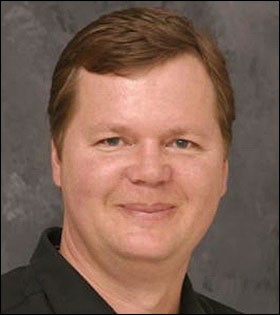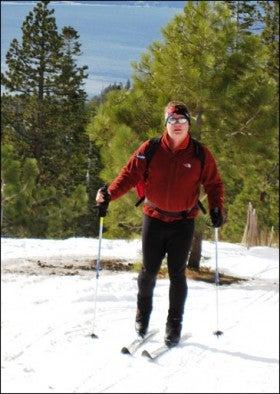Five questions for Thomas Hauser
Just a few months ago, Thomas Hauser came to the University of Colorado Boulder with the task of building a research computing group that will help faculty and researchers continue to be world leaders in their fields.
Hauser plans to provide advanced research computing services – computing, data storage, networking, information and data management and training – in a cost-effective and efficient way. One of his priorities is to develop a sustainability model that balances subsidies for infrastructure and buy-in from researchers.
Hauser has vast experience in computational science and engineering. He earned bachelor's and master's degrees in science, and a Ph.D. in mechanical engineering, from the University of Technology in Munich, Germany. He also was founding director of the Center for High Performance Computing at Utah State University from 2005 to 2009, and has years of teaching under his belt as well.
— Cynthia Pasquale
1. You were hired in August 2010 as director of research computing for the university. How did you choose computing as a career and are you enjoying Boulder?
I have a Ph.D. in mechanical engineering in computational fluid dynamics. I was always interested in computers and my Ph.D. research enabled me to combine my computing interests with solving engineering problems. I used supercomputers to do my research and was an early adopter of parallel computing for my work.
When I did post-doc work at the University of Kentucky, I collaborated with a group who designed and customized Beowulf cluster supercomputers (numerous computers designed to work large problems in parallel). I was responsible for optimizing the computational fluid dynamics program for a Beowulf cluster. We presented our work at the premier supercomputing conference and earned an honorable mention award for "Price/Performance" for this. After this, our group received a NASA grant to build custom Beowulf clusters for computational fluids research. So that got me more and more into this.
When I went to Utah State University, there was no large parallel computer there, and I needed one for my work. So I, with the help of students, built a large Beowulf cluster from parts. That, along with a successful proposal to the National Science Foundation (NSF) for another cluster, prompted the vice president for research to create the Center for High Performance Computing and I was made director.
I'm really proud of building something from the beginning, acquiring the funding and creating the infrastructure. We also collaborated within the state of Utah, the University of Utah and some of the state's teaching universities to create and advance collaborative technological infrastructure that supports and enhances the research and educational mission of institutions in Utah.
In 2009, I left Utah for Northwestern University in Evanston, Ill., to lead a newly created centralized research computing effort. Then I was recruited by Boulder. I love Boulder. I grew up in Munich – I started skiing at age 4 – and that's why I picked Utah and why I love Boulder. I enjoy the great outdoors here in Colorado.
2. You've said you want to advance opportunities for faculty and researchers with the newly created research computing group that is now in the Marine Street Science Building. Where is the process now and are plans on track?
We have a large supercomputer now, but are currently going through an acceptance phase to verify that the supercomputer and data center work according to specifications. This is taking longer than anticipated.
Computing is more than a computer: It's software, it's storage and it's people using it to advance knowledge. My group is working very hard to create the computing environment for our faculty. Once that's done, we need to get the faculty to begin using the resources.
Thomas Hauser enjoying backcountry skiing in the Lake Tahoe area. The native of Germany now takes advantage of outdoor activities in the Boulder area.
3. Part of your job is to keep CU competitive with other entities across the world when it comes to generating/analyzing research data. How do you hope to achieve this?
I'm interested in collaborating with faculty and researchers to apply the supercomputer to their science problems, and to utilize the supercomputer at its highest potential. Additionally, I would like to contribute to the computational science and engineering initiative. For years I've been involved with undergraduate and graduate students, teaching them about the capabilities of a supercomputer system and how to solve larger problems in their fields of research. I will also be working in collaboration with the library to provide the infrastructure and help faculty with data management, which is a currently a very big topic, because of the requirement of data management plans from NSF. I already have contributed to a couple of proposals and have taken the lead on a data storage proposal for CU-Boulder.
4. What are the biggest complications or concerns you have about computing on a large scale? Is security an issue?
Really, my biggest challenge is sustainability for research computing. CU-Boulder has made a big investment and I'm working with faculty and administrators to ensure that this effort can be sustained over time. Everyone needs to work together to ensure that the researchers are getting the proper hardware, that we balance subsidies and cost recovery, and that the research computing environment will be accessible to every student and researcher on campus.
Yes, my group takes security very seriously and will monitor our machine constantly. Something CU-Boulder is currently implementing is that you get a little key chain device that creates a number that changes every minute. This number together with a PIN is your password. This approach is more secure than a regular password that can be guessed or hacked.
5. You said you've enjoyed living in Colorado and the great outdoors. Have you had time to ski and explore the state?
Work is very important to me but I try to make room for other activities. I love skiing, hiking, backpacking and tennis. My wife and I are still exploring the area. Our favorite hiking area so far is in Rocky Mountain National Park, but we also enjoy the trails in the vicinity of Boulder. I'm more of a backcountry skier than a downhill skier, so I'm still exploring different places to ski. I'm also an active tennis player and my wife, Karina, and I played on teams before and plan to play on teams here, especially mixed doubles.
I've been in the U.S. for 13 years and we just applied for U.S. citizenship. The citizenship will make it easier to collaborate with national laboratories and will allow me to vote.
I miss some German food, but I love to cook so I make it myself. But I also enjoy the excellent food here in Boulder and in the Denver area. My parents visit a minimum of once a year and I try to go to Germany once a year, so I don't miss it that much.
I live in Louisville and as I drive into Boulder, I enjoy seeing the beautiful mountains every day.



